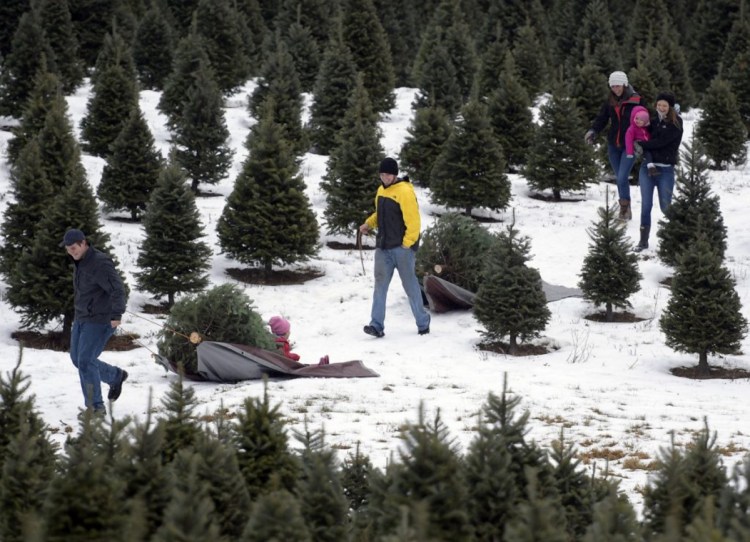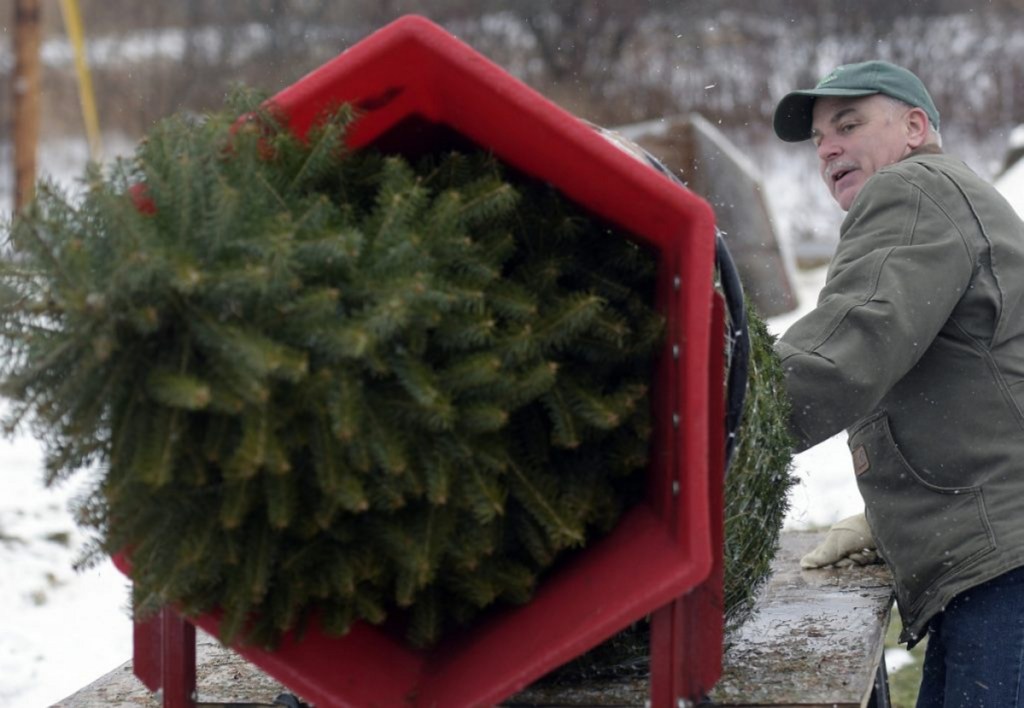CHINA — When Robert Palmer and his wife, Donna, purchased their Hanson Road farm here, he wanted to raise cattle. But deterred by the slaughtering involved, the duo opted to grow Christmas trees for the winter.
Ben and Molly’s Christmas Tree Farm, named after the Palmers’ beloved Spaniels, and other farms across central Maine opened for business Friday. Last week, farmers were crafting wreaths, trimming trees, baking cookies and mulling cider to prepare for throngs of Mainers in search of their holiday centerpiece.
Now in his second year of selling trees, Robert Palmer is expecting to see sales double from the 100 trees they sold last year. He said Sunday morning that he had sold 16 trees over the weekend, even with bitter cold and rainy conditions hampering travel.
“Each year, it seems to get better and better,” he said. “We prepare all summer long for this season.”
Growers say there is plenty of local stock for people who want a real tree, contradicting a news story that shoppers could have trouble finding a tree this year because of a tight supply. The report attributed last decade’s Great Recession to a diminishing supply of trees with eight- to 10-year growing cycles.
But Frank Zmigrodski, president of the Maine Christmas Tree Association and owner of the Oldfield Farms in Vassalboro, said that isn’t the case in Maine.
“I don’t know who started that rumor, but you should know there is no shortage in Maine,” he said, postulating that the artificial tree industry could be stirring the pot. “I know a few wholesalers that have extra trees.”
Joe Young, owner of Moose Hill Farm in Fayette, agreed, adding that trees will be available to customers throughout the season.
“I think that is a total myth,” he said of the perceived shortage. “No one will go away unhappy unless they can’t find a tree that they like; it’s not going to be because there’s a shortage.”
Zmigrodski said his 500-tree farm had a number of calls ahead of the season to confirm they were open the day after Thanksgiving.
Jim Corliss, owner of Piper Mountain Christmas Trees in Newburgh and spokesman for the Christmas tree association, said the weekend after Thanksgiving is usually one of the busiest of the year, second only to the first weekend of December.
“Thanksgiving weekend has become quite big,” he said. “After the second weekend in December, it drops right off.”
He said he’s noticed that customers are beginning to select narrower trees than in previous years. He referred to the shape as “the upside-down ice cream cone.”
“The most popular size is 7 to 8 feet and people have begun to like a narrower tree than used to be the case 30 years ago,” Corliss said. “It certainly influences how we shear them; it’s the narrow ones that get taken.”
Balsam firs are the industry standard in Maine, he said, but some Scotch pines and Frasier firs also grab a share of the market. He said artificial trees are the association’s nemesis – they take 1½ percent of the Christmas tree association’s market share each year.
Robert Palmer said he has had customers who turned away from artificial trees because they want to have the traditional outdoor experience of tracking down a tree.
“They want the outside experience with their families,” he said. “You’re getting some of that old family Christmas tradition back in the younger generation.”
Soon there could be a new option for real-tree enthusiasts. The Christmas tree association is working on breeding a “superior strain” of Balsam fir trees at its seed orchard, Corliss said.
The ideal tree would have upswept branches, a two-tone, dark-green color and grow in six years, rather than eight or 10. He said the association has gotten some successful specimens from the seed orchard.
Sam Shepherd can be contacted at 621-5666 or at:
sshepherd@centralmaine.com
Twitter: SamShepME
Send questions/comments to the editors.





Comments are no longer available on this story